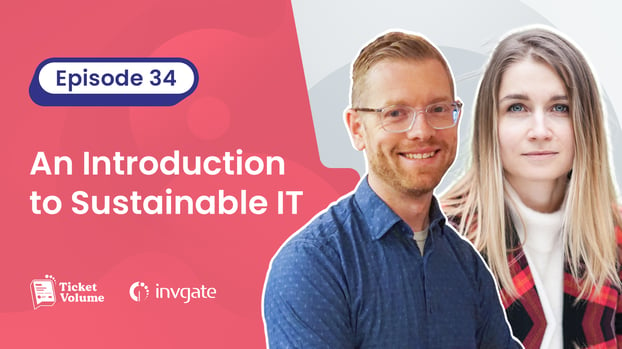While sustainable IT may have gained more visibility in IT publications in 2021, the concept itself is familiar. The idea of incorporating sustainability principles into information technology has been around for many years. However, with the increasing focus on environmental and social responsibility, the importance of sustainable IT has gained more attention in recent times.
Antonina Douannes provided insights into the comprehensive nature of sustainable IT on the 34th Episode of Ticket Volume, our IT podcast. She outlined the three crucial areas where it can be applied and emphasized the significance of adopting the appropriate mindset to drive meaningful change within a limited timeframe.
Antonina Douannes has 15 years of experience in the digital and IT industry. She is a Digital and IT Sustainability Leader, ITIL 4 Lead Editor, and the Co-founder and Executive Coach of Watermelon & FETA, a coaching program for aspiring leaders.
Seize the opportunity to listen to the entire episode and gain valuable insights into sustainable IT. Also, don't miss out on our monthly live recordings. Register now to gain valuable insights, ask real-time questions, and expand your knowledge.

Understanding sustainable IT
Sustainable IT refers to the practice of incorporating sustainability principles into all aspects of information technology. It is not a one-time initiative or program, but rather a mindset that should be integrated into all practices. Just like security, sustainability should be built into every service from the beginning, including development, procurement, and maintenance.
ITIL introduced sustainability in its publications exactly a year ago, during the COP26 conference in Glasgow. From Duoannes’s perspective, this shift in ITIL's approach has had a significant impact. It has become an integral part of all the practices and books, acting as a foundational layer that influences every aspect of ITIL. This includes the Foundation level as well. While this is not its sole focus, it should be a fundamental element at the core of IT Service Management (ITSM).
For Duoannes, sustainability in IT goes beyond environmental issues and also encompasses economic and social aspects. It involves creating value for society while addressing risks and opportunities in economic, environmental, and social areas. This means considering factors such as diversity, equity, human rights, and digital accessibility in IT operations.
|
|
"When we talk about sustainable developments we talk more about the global level; the country level the government level and that's the development that we as human beings should do to meet our present goals and not compromising the ability to meet future goals. (...) When we talk about sustainability we go already on a corporate level and we talk about the business approach that we use to create a value for society and other stakeholders, by addressing risks and opportunities in three pillars: economic, environmental, and social." Antonina Douannes |
While sustainability is recognized as an important aspect of IT, it is not a separate examination within the ITIL 4 framework. However, organizations are encouraged to incorporate sustainable practices into their IT operations to benefit both themselves and the wider community. The sooner organizations adopt sustainable practices, the better it will be for everyone, as it helps to ensure a more sustainable future.
The evolution of ITIL 4
The inclusion of new concepts and an emphasis on sustainability characterizes the evolution of ITIL 4. Initially, the framework did not encompass stability, but it has now been recognized as a crucial aspect. While previous versions of ITIL mentioned ethics and the human side of IT, ITIL 4 highlights explicitly their importance. Douannes played a pivotal role in bringing sustainability into ITIL 4 and emphasizing its significance.
To achieve sustainable IT goals, organizations are encouraged to consider initiatives that align with sustainable practices that go beyond environmental conservation. When making decisions about laptops or applications, it is important to take into account their impact on global emissions.
Douannes illustrated how operationalizing sustainability involves focusing on three key areas:
- Products and services: Making products more sustainable involves reducing electricity consumption and minimizing CO2 emissions associated with data storage.
- Business models: Sustainable business models can be achieved by optimizing processes to consume fewer resources and creating systems that benefit others beyond internal operations.
- The ecosystem: Considering the ecosystem means extending sustainability efforts to partners who share the same values and collaborating to promote sustainable practices.
Douannes can’t stress enough that organizations should reflect on the impact of data storage, resource consumption, and operational practices. Additionally, they should consider whether their products and services encourage wasteful behavior in customers.
Overall, the evolution of ITIL 4 recognizes the importance of stability, ethics, and sustainability in IT practices.
Reusing valuable metals
Douannes emphasized the importance of reusing valuable metals found in electronic waste as a means to reduce the need for new resource extraction.
It is unfortunate that people discard gadgets even though these devices can still be used by others. The problem lies in managing e-waste involves various processes, such as conducting preventative maintenance, destroying unusable devices, recycling components, and procuring necessary equipment. To determine cost savings and justify e-waste management initiatives, collaboration between IT and financial operations is necessary.
|
|
"In general sustainability cannot be achieved in silo, it's all about communication, cooperation, and co-creation. It doesn't matter to which departments we belong, IT plays a huge role, I would say one essential role because that's where a lot of Innovations come from." Antonina Douannes |
The IT industry plays a crucial role in achieving sustainability by bringing innovation and productivity. It is essential for departments like finance, HR, and IT to collaborate and find optimal ways to handle assets and improve communication within the organization. Ongoing dialogue and taking simple actions are emphasized as important steps towards sustainable practices. Recognizing and building upon existing actions can contribute significantly to sustainability efforts.
In terms of service design, there are practical use cases organizations can implement. For instance, organizations can choose cloud vendors based on their energy-saving practices. Additionally, implementing virtual meetings and remote work options can help reduce carbon emissions. It is important for service design to prioritize user experience and accessibility while incorporating sustainable practices. By considering these aspects, organizations can make strides towards a more sustainable future.
Bottom line
Organizations are encouraged to incorporate sustainable principles into their operations, fostering a more environmentally and socially responsible approach. But, this is just a summary of Ticket Volume's episode featuring Antonina Douannes but there's a lot more to discover in the recording. Be sure to listen to the full conversation with Matt Beran to learn more about sustainable IT.
You can find the full episode on popular platforms like Apple Podcasts, Spotify, YouTube, or any other podcast platform you prefer. Remember to subscribe if you're interested in joining the monthly live recordings!















